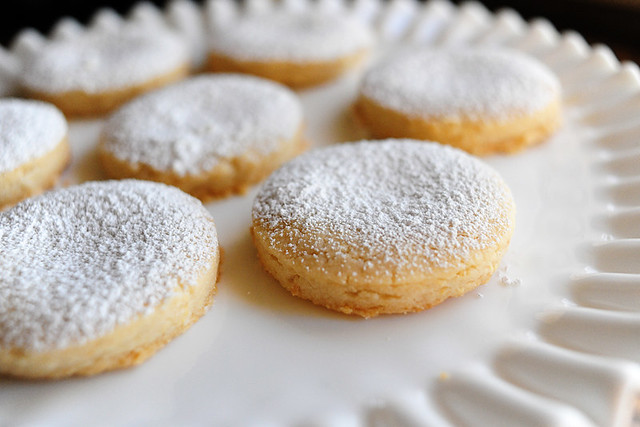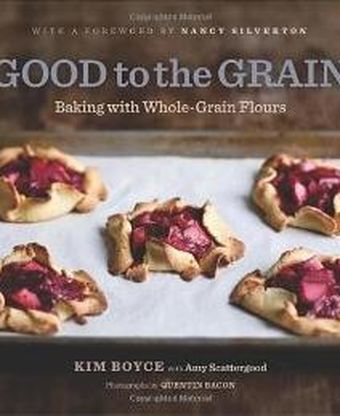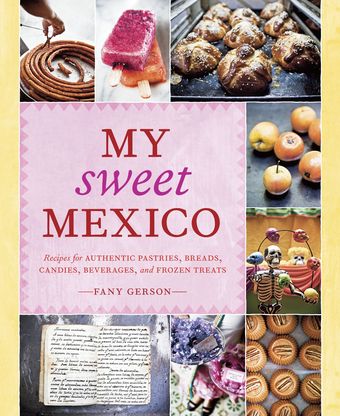“Please don’t make me choose.”
This was the plaintive request I almost sent the Piglet organizers after reading both cookbooks and testing the recipes I’d chosen. I couldn’t possibly choose a winner. I felt like I was being made to select between two good friends, one of whom had ebony hair and sang flawless renditions of Broadway show tunes, and the other of whom had chestnut hair and strummed peaceful, mellow John Denver songs on her acoustic guitar. At the end of my judging period, I couldn’t have parted with either cookbook…and I shan’t! (Amanda, you don’t want the books back, do you? Wait…don’t answer that.)
In the end, I did weigh both cookbooks exhaustively (this is not to be confused with weighing myself exhaustively, which was something I chose not to continue during the testing process) and declared a winner.
But I didn’t want to.
Can you tell I’m a middle child?
The first book I perused was Good to the Grain: Baking with Whole-Grain Flours by pastry chef Kim Boyce, and for the first thirty minutes of our new relationship, I didn’t read one word inside. Instead, I flipped slowly through the pages and inhaled the gorgeously-shot full-bleed photos of the most alluring pancakes, waffles, wafers, and breads I’d ever seen. As a lifelong cookbook buyer and self-taught food photographer, I remain in the category of home cooks who desire (and require) photos -- preferably with shallow depth of field and beautiful natural light -- of the finished recipes. The photographs by Quentin Bacon satisfied my soul.
And made me really hungry.
Once I determined that the photos thrilled me, I dug into the heart of the cookbook: scrumptious baked goods made with twelve different kinds of whole-grain flours, most of which I did not have in my kitchen pantry. Curiously, this excited me. As a woman inextricably attached to butter and cream (with zero plans to break from them at any point in my life), I’ve never felt necessarily loyal to enriched white flour as an ingredient. It’s just that the time and commitment it would take for me to educate myself as to how different flours and grains worked -- and how to successfully integrate them into my own favorite baked goods, like cinnamon rolls, scones, crusts, and cakes -- has always proved to be a deterrent for me. In terms of the timing and the willingness for me to learn something new that truly could transform the way my family and I eat, the book’s concept couldn’t have been more perfect. Ingredients -- everything from amaranth to teff -- are explained. Equipment needed to execute the recipes -- from a rasp to an ice cream scoop -- is recommended.
Deciding which recipes to test was an exercise in indecision, made worse by the wicked carb craving I was experiencing during the time I read the book. For both books, I decided to go with one standby -- a common baked good many Americans enjoy -- and two outside-the-norm recipes.
The standby for this cookbook, Buttermilk Pancakes (because I’m a pancake freak), was appealing to me because it uses Boyce’s recipe for a multi-grain flour mix, a blend of whole wheat flour, oat flour, barley flour, millet flour, and rye flour. I was able to find all of these ingredients within an hour and a half from my house, which is more than I can say, sadly, for ingredients in many highbrow cookbooks -- some of which I’d have to purchase a plane ticket to procure. (Don’t blame the cookbooks; it’s my rural geography that trips me up.) These pancakes, which also call for unsulphured molasses, were utterly divine, with a scrumptious grainy taste that my favorite all-purpose version will never have. I immediately made plans to whip up a larger batch of the flour mix and store it in an airtight container in my pantry. I’m currently making my way through the other recipes in the book that use the same mix.
The other two recipes, Poppy Seed Wafers (deeply colored, thin cookies with poppy seeds around the edge; yum!) and the more ambitious Ginger Peach Muffins (peach slices are cooked in syrup beforehand) were out-of-this-world. I felt good eating them. I ate too many. The second roll of the former, still wrapped in waxed paper in my fridge, is calling out my name as I write this, as are the recipes in the book that I haven’t tried, among them another pancake made bright red by the addition of beets, an oatmeal cookie iced with a cinnamon glaze, and -- help me -- Gruyere and corn muffins.
When I sat down with the second book, My Sweet Mexico: Recipes for Authentic Pastries, Breads, Candies, Beverages, and Frozen Treats by Fany Gerson, I immediately knew I was going to love it. The cover is bright and happy, and from what I could tell from the collage of cover shots, the photography would be right up my alley.
And it was. I spent my obligatory twenty to thirty minutes flipping through and sizing up the gorgeous photos of both beautiful recipes and vignettes from Mexican street fairs and festivals, and found them to be brighter and higher in contrast and saturation than those in the whole grain cookbook, whose photos were decidedly more ethereal and “grown-up.” I loved the photos of both books equally, but while I’d pour the whole grain photos a glass of Pinot Noir, I’d whip up the photos in the Mexico book a big, fat Margarita. They oozed life.
The food in My Sweet Mexico is gorgeous: I immediately opened to page 166, which showed a tray full of small pumpkins that had been stewed in a thick, sweet syrup for two hours. That color of orange will stay with me forever.
Deciding which recipes to try proved to be a little more of a challenge for me; while each one sounded and looked delicious, many of the ingredient lists and techniques were slightly beyond the scope of most recipes I’ve encountered. This didn’t deter me, of course; I’ll go to great lengths to eat something I want. It just took a little more time.
I started with a basic: Polvorones, known in our neck of the woods as Wedding Cookies, or Mexican Wedding Cookies. Oh dear. These cookies begin with clarified butter, which you mix with sugar and refrigerate. I could have stopped right there and eaten the cooled mixture with a spoon. The finished cookies aren’t hard, rounded balls as found in American supermarkets (not that I’m above eating twenty at a time if I’m hungry enough) but more of a delicate, melt-in-your mouth delight…and they’re the best Mexican wedding cookies I’ve ever eaten.

My second choice, a double-layered Tres Leches Cake (I’ve only made a single-layered one before) was everything a Tres Leches Cake should be, plus blueberries (though I was tempted to use canned peaches, which, as Gerson explains, are commonly used). I’ve eaten a lot of Tres Leches Cake in my life and it was all I could do not to share this one on my website the second I took my first bite. I used dark rum as the recipe called for (another addition I’ve never used with my own recipe) and it took the cake to another level. I’m still dreaming about it.
I am not a candy maker, so it was unfair to My Sweet Mexico for me to select Pistachio Caramels, one of the many candy recipes in the cookbook. I’m a mess when it comes to using a candy thermometer, or any other cooking technique requiring patience and precision, and while I was happy to eat the sad-looking fruits of my labor, my caramels weren’t fit for sharing with anyone I cared about. They were grainy and not right; and I’m 100% convinced this was my fault.
But I’m not stopping there. I have a list of earmarked pages I’m ready to try, the first of which are churros -- though I think I’ll do the single-strip approach rather than the six-foot coiled snake approach. Baby steps!
The Verdict
Since I agreed to participate in this cookbook judging contest, I selected Good to the Grain to advance to the next round, even though I know neither cookbook will leave my kitchen shelf for a long time to come. In the end, I had to go with the cookbook that I know I will use tomorrow morning, this weekend, next week, etc. Absent a willingness to banish butter or cream from my cooking, I really believe Good to the Grain will help me decrease the amount of white flour I use and, ultimately, alter the way I approach the baked goods I make every day in my life on the ranch: scones, cookies, breads, muffins.
I won’t be able to bake through the book fast enough.



13 Comments
This is a very interesting and well-written review (or reviews, I guess). I think Ree did an excellent job.
Darn, those wedding cookies look too good to be true.
By the way, I got my copy of The Essential New York Times Cookbook and am thrilled with it - and let me point out that I am old enough that my second cookbook was the Craig Claiborne Blue One given to me when I got married at 20 years old with the following Thomas Wolfe quote: There is no spectacle on earth more appealing than that of a beautiful women in the act of cooking dinner for someone she loves.
Re: Betteirene's comment, I would be the same way lol.